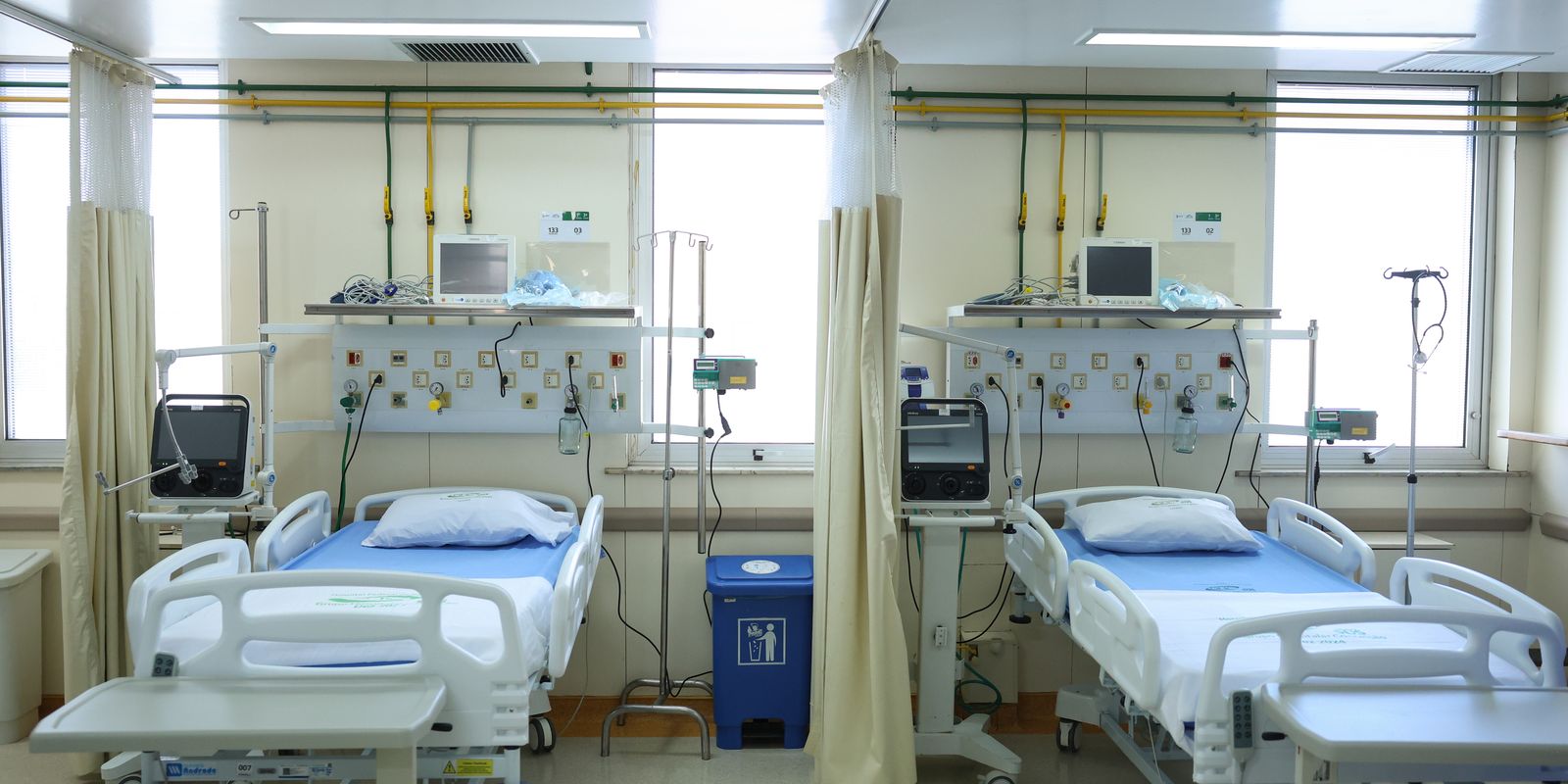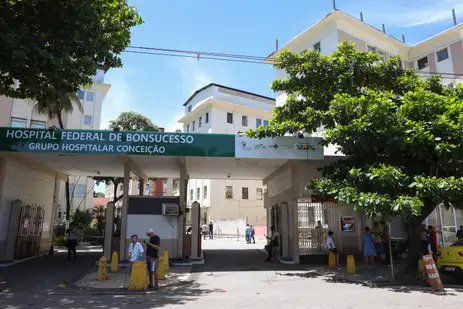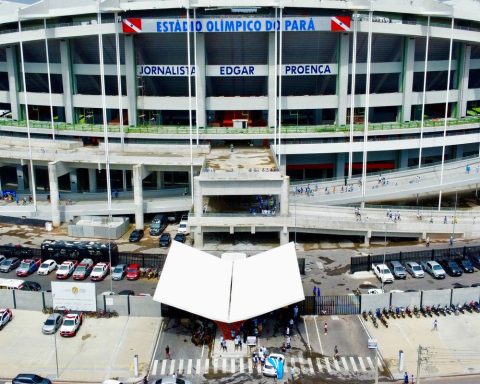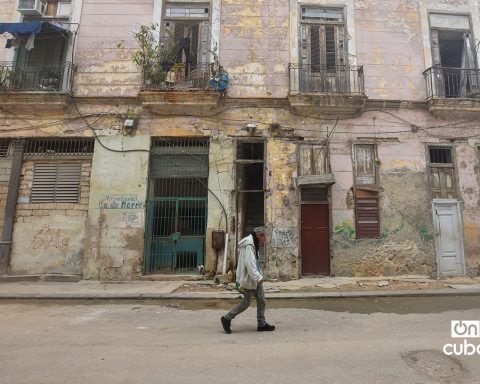The Bonsucesso Federal Hospital, one of six belonging to the Ministry of Health in the city of Rio de Janeiro, reopened 100 beds this Friday (17). The unit is one of four hospitals in which the department changed management throughout 2024, with the aim of improving service to the population.
A reference in specialties such as transplants and nephrology, the hospital, which is located in the Bonsucesso neighborhood, in the north of the city, underwent a change of management in October. Administration was carried out directly by the Ministry of Health and became controlled by Grupo Hospitalar Conceição (GHC).
At the time, of the 412 existing beds, more than half – 218 – were closed for reasons ranging from lack of staff and equipment to building infrastructure issues. The unit’s operation was below capacity, with emergency care suspended six years ago.
Since then, the GHC started to receive funds from the ministry and had the objective of reopening beds and the emergency department within 90 days, a deadline that would end on Sunday. Investments were made such as power cabling, installation of six large generators, hiring of employees, purchase of equipment and works on the building with 42 thousand square meters of built area.
“I’ll give you an example: roofs where it was raining inside”, quoted the CEO of GHC, Gilberto Barichello. In 2020, a fire forced the evacuation of almost 200 patients who were admitted to the hospital.
In total, the ministry will invest R$263.7 million in the Bonsucesso Federal Hospital, with R$45.5 million in 2024 and R$218.29 million in 2025.
Of the 100 reopened beds, 88 are in the infirmary, which reaches 80% of its capacity, 58 in the surgical block, 20 clinical and ten in pediatrics. Twelve are from intensive care units (ICU).
The emergency has not yet been reopened. The management’s expectation is to reestablish emergency care and deliver another 118 beds by the end of January.
GHC is a public company linked to the ministry and has a history of operating in Porto Alegre, where it is in charge of four hospitals, in addition to service centers.
Reference
The Minister of Health, Nísia Trindade, visited the remodeled facilities this Friday, including the ICU and the imaging exam room, closed since 2020, where x-ray and tomography machines were installed, which were unused in corridors from the hospital.
For the minister, federal hospitals are not a problem. “They are a solution to several specialized health problems, when you need the hospital, outpatient clinic and consultations,” said Nísia.
“It will be one of the main references in Rio”, stated the minister. She added that the hospital has the conditions for “more access to specialists and to reduce waiting times for exams and consultations”. Furthermore, he continued, “when surgery is necessary, being able to do it”.
The hospital’s superintendent, Elaine Lopez, stated that, in addition to the delivery of another 118 beds by the end of the month, it was possible to relocate structures, so that the hospital’s capacity can accommodate 423 beds. Furthermore, the manager promised expansion.
“Throughout the year, we will open more beds,” he told reporters when visiting an ICU. Commenting on the recovery of installed capacity, Elaine reported that, on Thursday (16), it was already possible for the unit to perform complex heart surgery.
“We have already performed heart surgery, we performed a corneal transplant on a child this week, the kidney transplant is going very well, which is symbolic, it is one of the few places in Rio de Janeiro that performs transplants on children and adults”, described Elaine Lopez.
Initial resistance
The government’s decision to transfer the administration of the Federal Hospital of Bonsucesso to GHC was criticized at the time by the Union of Workers in Health, Labor, Welfare and Social Assistance in the State of Rio de Janeiro (Sindsprev/RJ), which complained about a lack of government dialogue with civil servants.
The category even made a movement that prevented new managers from entering at the hospital. Because of the resistance, the new command took a week to take over the unit.
Upon delivery of the 100 beds, the CEO of GHC stated that he had resumed dialogue with categories, highlighting the Union of Nursing Assistants and Technicians. “It’s the biggest union here. We have almost 1,000 technical nursing assistant workers,” he said.
Barichello reported that, in 60 days, 1,800 of the approximately 2,500 employees who will make up the hospital’s workforce were hired. According to him, in 30 days, GHC purchased R$30 million in equipment, which includes furniture, surgical tables, monitors, mechanical fans, carts and an electrocardiograph. The resources were allocated by the Ministry of Health.
Minister Nísia Trindade states that the government’s decision to create the Federal Hospitals Restructuring Plan and remove the direct administration of some units from the portfolio, transferring it to a specialized company, was correct. “It is not possible to manage armchair hospitals in Brasília, that is a mistake.”
Nísia Trindade highlighted that the Federal Hospital of Bonsucesso is essential for the Unified Health System (SUS) in Rio de Janeiro, including serving patients from municipalities in the metropolitan region, notably Baixada Fluminense.
THE Brazil Agencythe municipal secretary of Health, Daniel Soranz, estimated that the reopening of the hospital in Bonsucesso should reduce the waiting list for beds in the capital by around 20%, which is close to 495 people.
Change in the federal network
In addition to the hospital administered by GHC, the Ministry of Health network in Rio de Janeiro has five more units: Hospital Federal do Andaraí, Hospital Federal Cardoso Fontes, Hospital Federal de Ipanema, Hospital Federal da Lagoa and Hospital Federal dos Servidores do Estado.
The department’s restructuring plan decided to fusion from the Hospital dos Servidores with the Gaffrée and Guinle University Hospital. The intention is to create a university hospital in partnership with the Brazilian Hospital Services Company (Ebserh) and the Federal University of the State of Rio de Janeiro (Unirio).
The Andaraí and Cardoso Fontes hospitals were forwarded to the city hall. The two units are expected to reopen 214 beds, reaching a total of 700 in operation in both. The ministry transfers resources to the city hall for administration, through companies specialized in the area. R$150 million was transferred to the city hall. In addition to this payment, it is planned to incorporate R$610 million in MAC ceiling (medium and high complexity care) for the city of Rio de Janeiro.
Secretary Daniel Soranz informed that he hopes to reopen the emergencies of both in early February. “The minister and the mayor [Eduardo Paes] They’re on my tail,” he said alongside Nísia.
According to the secretary, 42 beds have already been reopened in Andaraí, which will also have the radiotherapy sector back. And, according to the minister, the waiting list at Cardoso Fontes was reduced by 92%.
Asked by Brazil Agency Regarding the administration of the federal hospitals in Lagoa and Ipanema, Nísia stated that they present a “much more positive” situation and that she is studying how to provide better conditions, “always with a vision of partnership”.
“Often, it gives the idea that it is a distribution of hospitals, but no, it is solid, consistent work, to serve more. There is no point in changing any hospital if it is not to provide the same standard or better care. Everything is being done to be better”, he declared.



















